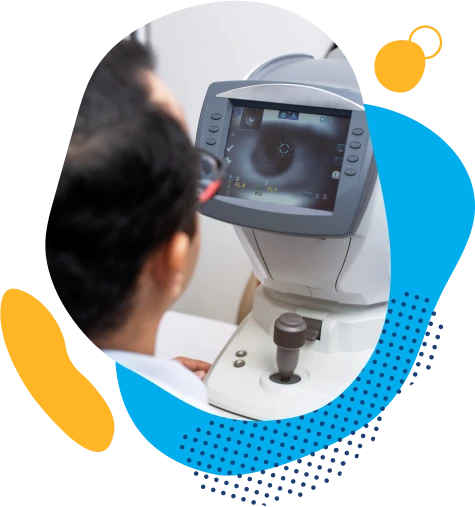Bring Life Back into Focus—Clearly, Brightly, Fully
From glasses and contacts to advanced laser correction, discover personalised solutions that sharpen your sight and brighten your world.
Book
Appointment



About

Refractive treatments are common vision problems that occur when the shape of your eye prevents light from focusing correctly on the retina. This results in blurred or distorted vision. The most common types include myopia (nearsightedness), hyperopia (farsightedness), astigmatism, and presbyopia. These conditions can affect anyone, regardless of age, and may lead to eye strain, headaches, or difficulty seeing clearly at certain distances. Fortunately, refractive errors can be corrected with glasses, contact lenses or advanced surgical options, helping you see the world with sharp, clear vision.
Symptoms
Hints Your Vision Drops
Before It Blurs
- Blurry or distorted vision
- Frequent squinting
- Eye strain or discomfort after reading or screen time
- Headaches
- Difficulty seeing at night or in low light
- Double vision in some cases
- Need to hold reading materials closer or farther than usual
- Seeing halos or glare around lights
- Excessive tearing or dry eyes due to eye fatigue


Treatments
Modern Solutions for
Timeless Clarity
- SILK – SILK (Smooth Incision Lenticule Keratomileusis) represents the next frontier in lenticule extraction. It combines ultra-fast lasers and ultra-smooth incisions for unprecedented precision, comfort, and visual outcomes. With minimal tissue disruption and rapid recovery, SILK is ideal for patients expecting nothing less than excellence.
- ICL – ICL (Implantable Collamer Lens) For those who aren’t eligible for laser procedures, ICL offers a powerful alternative. A soft, biocompatible lens is implanted inside the eye without reshaping the cornea. It's especially effective for high prescriptions or thin corneas.
- SMILE Pro – SMILE Pro is an upgraded version using advanced femtosecond lasers with faster cutting times and improved precision. It ensures shorter procedure durations, enhanced comfort, and even quicker recovery than traditional SMILE.
- SMILE – SMILE (Small Incision Lenticule Extraction) offers vision correction through a tiny 2-4 mm incision, without creating a flap. It preserves more corneal strength, causes less dryness, and ensures faster healing—especially suited for those with dry eyes or active professions.
- Contoura Vision – Contoura Vision (Topography-Guided LASIK) An evolution of LASIK, Contoura uses corneal topography data to customize the laser treatment for each eye. It addresses both refractive errors and corneal irregularities, resulting in sharper, more refined vision—often better than 6/6.
- LASIK – LASIK (Laser-Assisted In Situ Keratomileusis) has become the most popular laser vision correction procedure. It uses a microkeratome or femtosecond laser to create a corneal flap, followed by laser reshaping. Recovery is rapid, with high patient satisfaction and long-term stability.
- PRK – PRK (Photorefractive Keratectomy) was the first laser eye surgery technique. It involves gently removing the outer layer of the cornea before reshaping it with a laser. PRK remains a dependable option, especially for patients with thinner corneas or surface irregularities.
Why Choose Maxivision?
Because Your
Eyes Deserve the Best
Testimonial
My dad had a cataract operation on both eyes, which was a smooth process. The service and after-treatment have been excellent, especially with Dr. Suresh, who has been giving excellent advice to the patients.
I had an excellent experience at the hospital, where the facilities were modern, clean, and well-maintained. The doctors and staff were incredibly kind, professional, and attentive throughout my treatment. I felt genuinely cared for, and the recovery process was smooth and reassuring.
Maxivision is best for critical eye problems, and I experienced it as a patient. This is one of the best hospitals with so many specialists. Visit Maxivision Super Hospital for the best experience in eye care. Thank you!
I had a great experience at Maxivision Super Specialty Eye Hospital! The friendly staff and skilled doctors made me feel at ease and clearly explained my treatment options. The modern and clean facilities impressed me. I highly recommend this hospital for top-notch eye care!
I highly recommend it to anyone for reliable, high-quality eye care services. Good facility and quick response. Thank you, Maxivision Eye Hospitals!
Experience with Maxivision Opticals was awesome. The shop has a wide variety of frames and glasses. Shop executives showed me many options. Overall experience and quality of products is top-notch.
Faq’s?
What Are The Symptoms Of Refractive Treatments?
Some of the symptoms of uncorrected refractive error are blurred or distorted vision; headaches, squinting and eye strain; difficulty reading; double vision; ‘halos’ around bright lights, and haziness.
How Do You Fix A Refractive Treatments?
There are a few simple solutions that are available to correct refractive errors, including eyeglasses, contact lenses, or different kinds of surgery. Eyeglasses are the most common and simple solution. An eye care professional can measure you for a pair of eyeglasses for effective correction.
Contact lenses are a less common but still popular treatment for correcting refractive errors. They work by placing an artificial lens on the film of tears covering the eye’s surface.
Corrective surgery is a possibility for some patients. Corrective surgery options include refractive laser surgery and intraocular lens (IOL) implant surgery.
Can Refractive Error Lead To Blindness?
Uncorrected refractive error is the second leading cause of blindness in the world. An eye care professional can diagnose refractive errors after a comprehensive eye examination. It can be treated in most cases with a simple pair of glasses. However, if left untreated, it can have a big impact on educational outcomes, productivity, and the quality of life of those affected. In children, uncorrected refractive error can sometimes lead to amblyopia, also known as lazy eye.
How are refractive errors diagnosed?
A refractive error can be diagnosed with a test known as refraction during a comprehensive dilated eye examination, either with a computerised instrument (automated refraction) or with a mechanical instrument called a phoropter (manual refraction). The ophthalmologist uses an assortment of lenses to determine the type of corrective eyeglasses or contact lenses that can help the patient’s eyes focus better for clearer vision.
Will I need glasses after undergoing SMILE Eye Surgery?
In most cases, you won’t need glasses. According to FDA reviews, 98.5% of patients experienced significant vision improvement, and 93% achieved near-perfect vision after SMILE Eye Surgery. However, this procedure doesn’t prevent age-related vision changes like presbyopia or cataracts, which may require glasses in the future. It does, however, provide excellent long-term correction for existing vision problems.
Is PRK permanent?
Like LASIK, PRK is a permanent adjustment to the eye’s optics. Over time, ageing introduces changes in your vision that can be addressed by repeated surgery.
How long does it take to recover from PRK?
Recovery from PRK takes longer than LASIK, which can take less than a week. PRK recovery is usually a minimum of one to three months. Full vision stabilisation can take as much as six months to a year. During stabilisation, your eye doctor can provide correction options like glasses to help with driving and other visually demanding tasks.
What is the recovery time after SMILE Pro?
Recovery is typically fast, with significant vision improvement within a few days; full recovery may take a few weeks.
Are there any risks or side effects?
Common side effects include temporary dryness, light sensitivity, and blurred vision. Serious risks are rare but can include infection or vision changes.
Can both eyes be treated with SMILE in the same sitting?
Yes, the laser procedure is usually done for both eyes at the same time, as we do not ‘enter’ the eye, but just work on the surface; also, both eyes have to recover visually in a binocular way.
Your Eye Care Matters:
Book Your Appointment Now!





 Chat with us
Chat with us